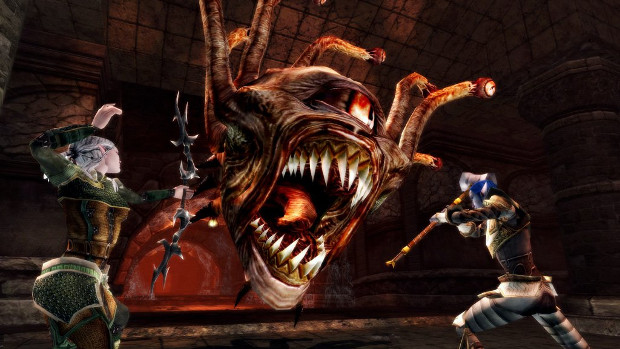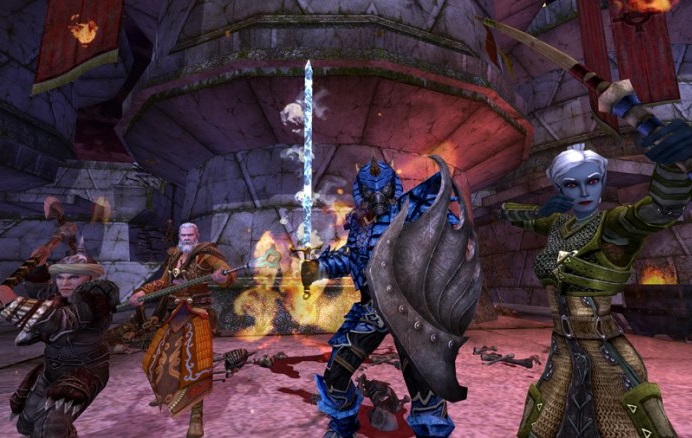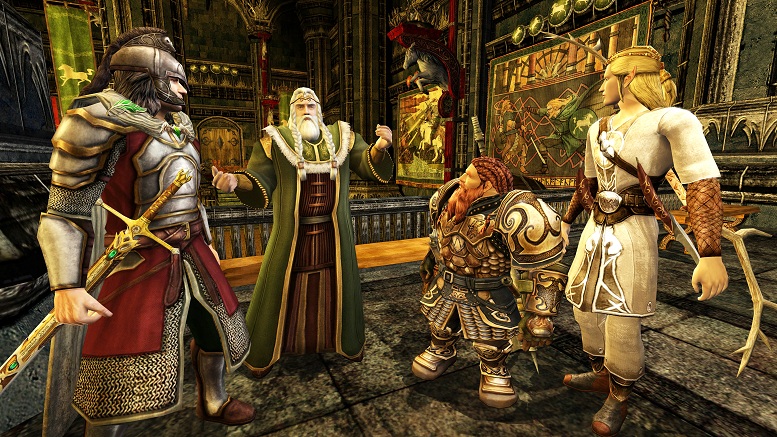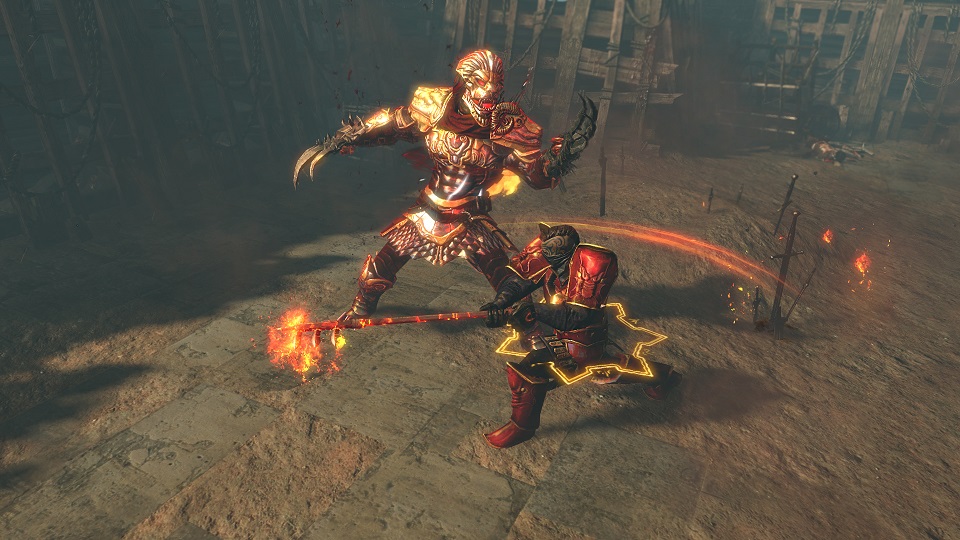10 Years Ago Today, Dungeons & Dragons Online Set The Stage For Free-to-Play's Future
Ten years ago today, MMOBomb was born. Well, not technically – the site officially went online in April of 2011, 20 months after September 9, 2009. But spiritually, the site became a viable concept on that date, when Turbine announced that Dungeons & Dragons Online was going free-to-play.
At the time, I had just started working full-time as an editor with Beckett Massive Online Gamer (and I do mean “just”; my first day was only a week prior) and this was big news. There had been free-to-play MMOs before, but pretty much all of them were made by Asian companies. I had sampled a few, such as MapleStory, Combat Arms (both by Nexon), and Requiem (Gravity Interactive), which I'm a little surprised to see is still running. None managed to hold my interest for more than a couple weeks, whether due to their foreign feel (MapleStory), shoddy mechanics (Combat Arms) or both (Requiem). The cash shop wasn't really an issue for me in any of those games, though, since I didn't play any of them long enough for it to be a factor.
But here was an American company, Turbine, with its highly polished (for the time) MMORPG, making the leap to free-to-play on PC. It was a big risk – or was it?
Grave reviews
Dungeons & Dragons Online hadn't been nearly the hit that it was expected to be. It was still in development when World of Warcraft launched, rewriting the rules of MMORPGs in the process, and DDO instantly felt sluggish and needlessly complex upon its launch in 2006. A look at the game's Metacritic page finds reviews that state things like
“DDO simply falls short of expectations when it comes to providing accessible gameplay for solo or group play”
and
“Just be aware that if you don't bring your whole family, you won't have much fun.”
Even a slightly gentler review – one listed as giving the game an 80/100, said
“Best with friends - but what isn't?”
Being able to solo content was all the rage in MMOs in the mid-2000s, and DDO's group-focused approach – which made perfect sense for a video game based on the classic party-based RPG – didn't resonate with a fan base that now looked at Blizzard's behemoth as the only way to do things. Having a “curious but elegant leveling system,” as one positive (84/100) review put it, was also off-putting for players looking for more straightforward progression.
So, DDO had underperformed for three years and, faced with competition from all sides, was probably on the chopping block. Taking it free-to-play was a risk, but it would have been a risk not to take it free-to-play, as well.
Free thinking
Making it F2P when it launched would have been a bigger risk, though that was apparently on the table. In an interview with Gamasutra shortly after the F2P launch in 2009, DDO Executive Producer Fernando Paiz said that “(In 2006) there was a certain amount of inertia regarding what business models were viable for MMOs.” He said that microtransactions were a consideration, “but there was a feeling that the market wouldn't accept it.”
He was probably right. DDO launched just 16 months after World of Warcraft, when everyone was scrambling to find the “next WoW”/”WoW killer,” even Turbine itself, which launched the rather WoW-like The Lord of the Rings Online in April 2007. If Blizzard could get everyone to pay $60 up front plus $15/month for solo-heavy content in an online RPG, surely we could too?
By 2009, that was already starting to seem like a dim memory, as MMO after MMO fizzled upon launch or shortly thereafter. It was probably the best time to take a struggling three-year-old MMORPG free-to-play – far enough removed from the afterglow of WoW's launch and yet not too old yet as be totally forgotten.
And thus, free-to-play became accepted in the West … mostly. Unless you're of the opinion that everything free-to-play is terrible, you'd probably argue that there have been good F2P games, bad F2P games, and more than a few that started out looking good but turned bad. (While I never played enough DDO to form an opinion about it, I'd put The Lord of the Rings Online in that last category.) Quality concerns aside, DDO set the stage for the decade that came after, proving that – at the very least, financially – free-to-play gaming could work outside of Asia.
An alternate view
If Turbine hadn't taken that plunge with Dungeons & Dragons Online, what would things look like today? Would another publisher, like BioWare with Star Wars: The Old Republic or Trion Worlds with Rift have taken the same risk with their big-budget subscription-based MMORPGs when they fell on hard times? Would we have fully F2P games like Path of Exile or Warframe?
It's worth noting that now-huge games World of Tanks and League of Legends were in development at the time of DDO's announcement. In fact, League launched into open beta just a month later, so I think the F2P “revolution” might have still happened but possibly on a smaller scale, and there would be fewer MMORPGs (as opposed to other online games like MOBAs) using the model today. And there might not be a spectacularly awesome website devoted to free-to-play gaming ...
Whether that's a good or a bad thing is something we can debate, but it's a near-certainty that DDO's “risky” move of a decade ago paved the way to change how we game forever. As many F2P games as there are out there now, though, there's one piece of advice in that Gamasutra piece, from Atlus Online's Jamie Ortiz, that should serve as a notice, both to developers and to players who still love free-to-play gaming: “You need a great game. You need a game that's built around this kind of business model that has deep and rich content.” That's just as true today as it was 10 years ago.
Related Articles
About the Author

Jason Winter is a veteran gaming journalist, he brings a wide range of experience to MMOBomb, including two years with Beckett Media where he served as the editor of the leading gaming magazine Massive Online Gamer. He has also written professionally for several gaming websites.
More Stories by Jason WinterRead Next

As if Wraeclast wasn't bleak and dreary enough, Grinding Gear Games is now adding giant putrescent sacs to Path of Exile in its next expansion, Blight.
You May Enjoy

We’ll say that cautious excitement is warranted for fans of the IP.

It’s not all Overwatch and CoD.

Provided they reach a specific point in the game that is.

The year-long story begins now.




And, by the way, nowadays most of it is perfectly soloable if that's your thing.
Even today hardly anything can measure up.
I used to play cleric, even the community was amazing.
People used to buy me passes to pay-walled content just so they can drag me with them. xD Ah~ Beautiful times those were indeed....
I had an absolute blast in DDO, and i will always remember.
The bane of F2P?
The , mostly courtesy of Korea.
F2P as a model is perfect.
It's problem is that it is exploited like there is no tomorrow which hurts the trust in it.
Games like Path of Exile had demonstrated perfectly well to everyone how to run it right.
It's not really the fault of F2P if you suck at doing it right, or are plain greedy A-person.